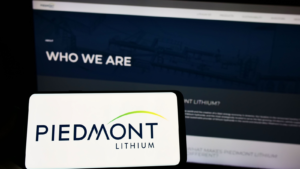There’s growing speculation lithium prices are finally bottoming out. And if that’s the case, it’s time to look at some of the top lithium stocks to buy.
Remember, as I noted just days ago, Sociedad y Quimica (NYSE:SQM) CEO Ricardo Ramos expects lithium prices to remain stable this year, and for sales volumes to improve.
Pilbara (OTCMKTS:PILBF) even said it’s seeing buying interest again, too. “All our customers, for avoidance of doubt, are taking their product and, in some cases, asking for more,” said Pilbara Minerals’ Managing Director Dale Henderson, as noted by Bloomberg.
In addition, according to Statista, by 2030, global demand for lithium is expected to pass 2.4 metric tons, which doubles the demand forecast for 2025. By 2035, they added, demand could reach 3.8 million tons. Then, by 2040, lithium demand could increase 40 times over expectations for increased EV adoption and energy storage needs.
On top of that, lithium producers have warned that global supply may not meet demand. That being said, it’s a good idea to start looking at some of the top lithium stocks to buy.
Albemarle (ALB)

Since topping out around $320 in late 2022, Albemarle (NYSE:ALB) plunged to a recent low of $106.69. And while it’s been an ugly descent, it’s safe to say most of the negativity – including news of a capital raise –have been priced into the down, but not out stock.
Helping, the company recently posted EPS of $1.85 on sales of $2.4 billion. Meanwhile, analysts were only looking for EPS of 98 cents on sales of $2.2 billion. While the new numbers were down year over year, they were still better than expected. Better, ISI Evercore analysts now have a buy rating on ALB with a price target of $190.
Analysts at Mizuho also just raised their price target on ALB from $105 to $115 per share, with a neutral rating. Oppenheimer analysts also say that it’s time to buy ALB again, too.
Also, while some traders are still nervous about lithium prices, it’s time to buy the blood in the streets, as Baron Rothschild would suggest.
Piedmont Lithium (PLL)

Piedmont Lithium (NASDAQ:PLL) could push aggressively higher if it gets the go-ahead from North Carolina on its lithium project. If that happens, the company says its mine could be one of North America’s biggest sources of lithium for electric vehicle batteries. Right now, it’s just a wait-and-see. All we know now is that, according to a company release,
“We continue to make advances towards our mining permit in North Carolina for our Carolina Lithium Project, with the most recent set of questions from the state indicating that the review process for this important milestone could be approaching its conclusion. Our Carolina and Tennessee projects are strategically located in the growing Battery Belt and critical to the goal of achieving some level of lithium self-sufficiency in America.”
In addition, analysts at BMO Capital recently initiated coverage of Piedmont Lithium with a Market Perform rating, with a price target of $20.
Pilbara Minerals (PILBF)

Over the last few weeks, shares of Pilbara Minerals (OTCMKTS:PILBF) ran from about $2.10 to a high of $3. Now back to $2.71, there’s still plenty of opportunity to be found.
For one, Australian firm, Morgans just added Pilbara Minerals to its best ideas list.
They said, “We view PLS as a fundamentally strong and globally significant hard-rock lithium miner. The company has successfully executed on ramping up the expansion of Pilgangoora while progressing plans to expand output. Supported by a strong balance sheet, with net cash at ~A$2.1bn at the end of December, PLS’ expansion plans remain uniquely undeterred by the significant weakness in lithium prices,” as quoted by The Motley Fool.
Pilbara also said it’ll focus more on cost-cutting measures to help preserve cash, as noted by Canaccord Genuity. “The market has been pricing for lower lithium prices, but I think what it didn’t expect was solid operations and company signaling a continued ramp-up” they added.
American Lithium (AMLI)

There’s also beaten-down shares of American Lithium (NASDAQ:AMLI).
After slipping from about $1.75 to 70 cents, AMLI is starting to bounce from oversold RSI, MACD, and Williams’ %R. Helping, the company recently submitted an environmental permit study for its Falchani lithium project in Peru. Hoping to receive approval within months, it could help fast-track construction permits.
AMLI also tripled the estimated value of its Falchani lithium projects in Peru. As noted by Seeking Alpha, “The company said Falchani’s estimated value has tripled from the previous forecast to $5.11 billion and that the project would have a potential operating life of 32 years.”
In addition, Simon Clarke, CEO of American Lithium just said, “This was an extremely busy period with significant achievements across our projects in Peru and Nevada. This momentum has continued past quarter end with the completion of the updated PEA [Preliminary Economic Assessment] for Falchani, highlighting very robust economics for the project, including a tripling of NPV [net present value] from the last PEA.”
Arcadium Lithium (ALTM)
There’s also Arcadium Lithium (NYSE:ALTM).

With about $1.9 billion worth of combined total revenue in 2022, ALTM is an all-stock merger of equals between Allkem and Livent. And, according to an Arcadium Lithium release, the new company “is one of the largest integrated producers of lithium chemicals in the world.”
Helping, analysts at Scotiabank initiated coverage of ALTM with a sector perform rating, with a price target of $6.25.
Earnings could use some improvement, though. In its last quarter, the company posted EPS of 34 cents, which beat estimates by 11 cents. However, revenues of $181.8 million were down about $36.9 million. However, both numbers are likely to improve, as lithium slowly recovers.
Helping, according to Paul Graves, President and CEO: “One of the many benefits of the merger is the opportunity to both optimize and de-risk our growth projects that have natural overlaps. By slowing capital spending in 2024, we can accelerate the work needed to drive capital efficiencies in both Argentina and Québec. We expect this will ultimately help us realize lower overall capital spending across the Fénix and Sal de Vida projects, as well as between the James Bay and Nemaska Lithium projects.”
Sprott Lithium Miners ETF (LITP)

One of my favorite ways to trade the lithium story is with an exchange-traded fund (ETF). Not only do they allow you to diversify with dozens of stocks, but they’re also far less expensive. Look at the Sprott Lithium Miners ETF (NASDAQ:LITP), for example.
With an expense ratio of 0.65%, the ETF has 49 holdings, and trades for just under $11 a share. While its chart is a disaster, that’s to be expected with the latest pullback in lithium stocks. However, with growing demand for lithium, and the potential for short supply, the ETF will eventually come back strong.
Some of its top holdings include Albemarle, Lithium Americas (NYSE:LAC), American Lithium, and Ganfeng Lithium (OTCMKTS:GNENF).
Technically, after bottoming out at around $8.50 a share, the LITP ETF ran to $10.93. Now at $10.23, it’s just starting to pivot higher again. Moving forward, I’d like to see it test $12.50 initially.
Global X Lithium & Battery Tech ETF (LIT)

Another safe way to trade the lithium story at a low cost is with the Global X Lithium & Battery Tech ETF (NYSEARCA:LIT).
Not only is it excessively oversold, but it also offers solid exposure to other beaten-down lithium-related names: Albemarle, Tesla (NASDAQ:TSLA), BYD (OTCMKTS:BYDDF), and Panasonic Holdings (OTCMKTS:PCRFY) to name some of its 46 holdings.
Last trading at $44.76, I’d like to see the LIT ETF initially retest $52. The fund will also benefit from a potential transition to green energy, and it’s need for lithium.
As I noted on Feb. 3, at the 2023 Conference of the Parties (COP28) meeting, 200 countries agreed to transition from fossil fuels, drafting text that would result in“tripling renewable energy capacity globally and doubling the global average annual rate of energy efficiency improvements by 2030,” according to CNBC.
Two, according to the International Energy Agency (IEA), the world has a “real chance” of achieving those COP28 targets. The agency added that the world added about 510 gigawatts of renewable energy capacity in 2023, a 50% jump year over year, I added.
On the date of publication, Ian Cooper did not hold (either directly or indirectly) any positions in the securities mentioned. The opinions expressed in this article are those of the writer, subject to the InvestorPlace.com Publishing Guidelines.

